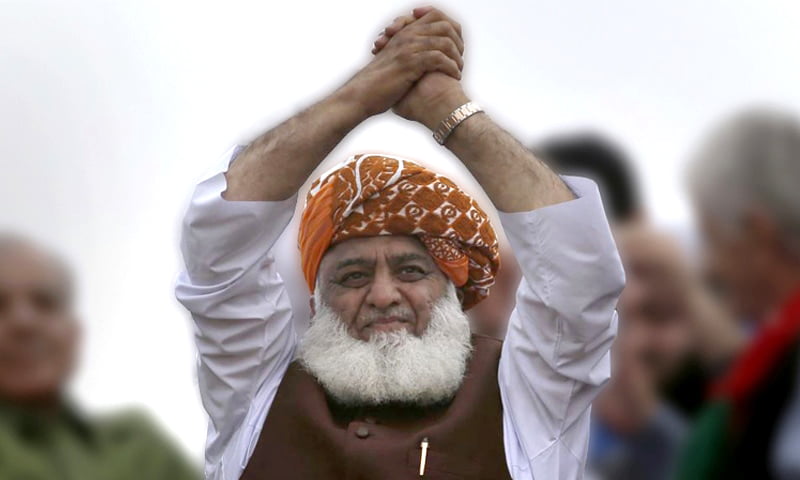Fazl ur Rehman raised questions on elections credibility
PDM parties tabled No confidence was “on the directives of ex-army chief General (retired) Qamar Javed Bajwa and ex-DG of the ISI Lt Gen (r) Faiz Hameed”.
Jamiat Ulema-e-Islam (JUI-F) Chief Maulana Fazlur Rehman on Thursday opened a new Pandora box about no-confidence motion that ousted former prime minister Imran Khan, alleging that ex-army chief General (retired) Qamar Javed Bajwa and ex-DG of the ISI Lt Gen (r) Faiz Hameed were responsible for this .
In an interview on a private news channel, Fazl, who was at that time the chief of Pakistan Democratic Movement (PDM) responsible for removing Khan, alleged that
He added:
“Gen Bajwa and Gen Faiz gave instructions about the no-confidence motion and PML-N and PPP sealed it. Gen Faiz said that we can do everything within the limits of the system and he had no objection to it.”
“I was personally against the no-confidence move […] but if I had said no despite insistence of other parties, then an impression would’ve been that I ‘saved’ the PTI founder”.
The PDM removed the Pakistan Tehreek-e-Insaf (PTI) government in April 2022 and led by Shehbaz Sharif, the multi-party alliance ruled the country for 16 months before handing over the reins to the caretaker set-up.
At first, Khan insisted that the US had him removed — a claim that the Joe Biden administration vehemently rejected. However, the ex-prime minister later shifted the blame to Gen Bajwa.
Fazl, during the interview, said:
“While the Pakistan People’s Party (PPP) was running the movement for a no-confidence motion, Lt Gen (retd) Faiz Hamid told me that I could do whatever I wanted, but within the system”.
The JUI-F chief said Hamid told him that he could not
“do anything outside the system” — meaning that every move should be made inside the parliament, not on the streets…But I rejected his directions,”
He said, but noted that later on, the Balochistan Awami Party (BAP), Muttahida Qaumi Movement-Pakistan (MQM-P), and others left the PTI-led government.
“When they said that [the anti-PTI] is now in majority, I had to agree with them otherwise it would’ve been said that I helped save Imran Khan,” the JUI-F chief, said.
Fazl rejected February 8 election results which did not return a clear majority for anyone, but independent candidates backed by Khan won 92 out of 264 seats, making them the largest group, followed by PML-N (79) and the PPP (54).
However, every party, even the PML-N which is seemingly about to form the next government, is unhappy with the election results.
For his party, Fazl has decided to join the parliament, but not become part of the government. “The decisions will not be made in the parliament anymore, they will be made on the streets”.
He noted that apparently, “rigging in elections” benefited the PML-N and there’s a rumor that Nawaz was not winning the Lahore seat.
Fazl said that PML-N’s Prime Minister candidate Shehbaz had paid him a visit to speak about government formation, but he rejected the idea and instead called on the Nawaz-led party to join him in the opposition.
“But Shehbaz left without responding to my offer […] for me, the parliament has lost its credibility. If the establishment said this that the elections were fair, then the May 9 narrative has been buried.”
Fazl said that both the 2018 and 2024 elections were rigged. “We have decided to protest against this vote theft. Now the decisions would be taken on the ground rather than in the assembly,” he declared.
Regarding discussions with PML-N President Shehbaz Sharif on government formation, the JUI-F chief disclosed his refusal to participate. “I believe whatever happened during the 2024 elections, it benefitted PML-N. There are rumors that Nawaz Sharif was given the Lahore seat,” he added.
He cautioned that if PML-N and other political parties proceed to form the government, they would be held accountable for the consequences. “I don’t see a [bright] future for the parliament, therefore, I invited PML-N to sit with us,” he stressed.
Fazl also expressed optimism about resolving differences with the PTI, indicating a willingness to engage in dialogue.

